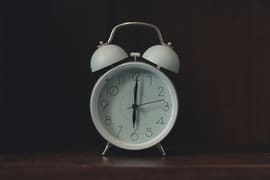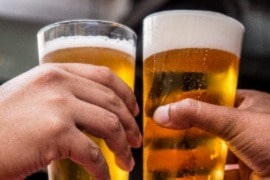Article at a Glance:
Some medications can help people reduce or stop drinking, although no medication cures alcoholism.
FDA-approved medications to treat alcohol use disorder are Acamprosate, Disulfiram, and Naltrexone.
Anticonvulsants and Baclofen can be used to help someone stop drinking.
The effectiveness of medications varies between individuals.
The Recovery Village can help people use medication options to support their recovery.
FDA Approved Medications to Stop Drinking
The FDA has approved three medications for use in the treatment of alcohol use disorder (AUD):
- Acamprosate
- Disulfiram
- Naltrexone (oral and extended-release injectable)
In addition to the FDA-approved medications, other drugs are sometimes used off-label (without FDA approval) for treating AUD, such as:
- Anticonvulsants (including topiramate)
- Baclofen
Vivitrol (Naltrexone)
Vivitrol (naltrexone) is an opioid antagonist (blocker) medication, but it appears to reduce cravings in some individuals seeking treatment for AUD. This has generally been supported by the research literature, although it is still not possible to predict whom it will work well for.
The research evidence suggests that naltrexone is more suited to helping people reduce their alcohol consumption than it is for helping them to stop drinking alcohol.
However, a recent study demonstrated that Vivitrol merely accelerates a reduction in cravings by a few days. People treated with Vivitrol for alcoholism experienced a reduction in cravings that equaled out with those not treated with Vivitrol by about day 8 of treatment, thereafter the level of cravings were not different.
In this article, we review the major FDA-approved and off-label medications used to treat alcohol use disorder. Some may be useful adjuncts to treatment for some individuals.
For people who are addicted to alcohol, stopping drinking can be a formidable obstacle. For many, all attempts at stopping are in vain, despite repeated earnest attempts. As they watch their alcohol use progressively destroy their lives, they become understandably desperate.
There are some medications that may help some people reduce or stop their obsessive drinking. However, it must be emphasized that, at best, these medications are an adjunct to getting proper treatment for alcohol addiction. There is no pill or no chemical that cures alcoholism.
Rather, lasting, long-term recovery from alcohol use requires carefully identifying and addressing the causes of the addiction and the effects of the drinking and related behaviors on mind and body. That is the function of alcohol treatment programs and the basis of their success.
However, for those who are seeking proper treatment for their alcohol addiction, there are some medication options that may be useful as a tool to support their recovery. The medications’ effectiveness varies between individuals because no two individuals are exactly alike.
Pros
- Naltrexone does not cause dependency
- Naltrexone is a very safe medication
- Naltrexone for alcohol cravings can be given as a long-acting injection for those who are not good pill-takers
- Naltrexone may be a helpful addition to the usual treatment (biopsychosocial counseling and treatment programs) for some people, especially during detox
Cons
- Only one out of nine people are helped to reduce their drinking by taking naltrexone for alcohol abuse
- Only one out of twenty people are prevented from drinking (abstinence) by oral naltrexone
- Vivitrol for alcohol abuse is not associated with serious side effects but may cause stomach pain, nausea, and loss of appetite
- There is no evidence that treatment with Vivitrol leads to improvement in the quality of life above the usual treatments for AUD
Antabuse (Disulfiram)
Antabuse is a rather unusual medication in that it is designed to punish individuals who drink alcohol by making them very sick. It blocks one of the enzymes involved in alcohol metabolism so that toxic metabolites accumulate in the body and cause an unpleasant reaction: rapid heart rate, flushing, nausea, and vomiting.
As such, Antabuse uses a psychological deterrence to alcohol use by providing negative reinforcement; it does not have a direct pharmacological effect in preventing relapse.
However, disulfiram’s efficacy is heavily dependant upon supervised use of the drug; otherwise, people who are planning to relapse simply stop taking the medication. One large study showed that only 20% of people who take Antabuse are compliant without supervision. The psychological threat deterrent created by the drug is completely removed when the drug is stopped.
Pros
- Supervised Antabuse appears to be more effective in the maintenance of abstinence than either naltrexone and acamprosate.
- Antabuse for alcohol treatment helps people learn to live without drinking, improving their ability to exercise self-control
Cons
- Antabuse therapy has a very low compliance rate
- Any potential benefits to Antabuse appear to be completely eliminated when the drug is not administered under supervision
- Besides the adverse effects from combining Antabuse and alcohol consumption, Antabuse has other bothersome side effects (most common: bad breath, rash and acne, fatigue, sexual dysfunction, and headache)
- Some clinicians oppose the use of disulfiram over objections of using an aversion (punishment-based) therapy
Campral (Acamprosate)
Campral is a novel medication to stop drinking. It acts on the same neurotransmitter systems that alcohol targets in the brain (glutamate, NMDA and GABA), apparently acting as an agonist and antagonist (blocker) and modulator of the receptors. Therefore, its effects appear to be from stabilizing the neurotransmitter system from the effects of alcohol.
Treatment with acamprosate for alcoholism is initiated once individuals have been detoxed from alcohol (not before five days after the last drink). Combining acamprosate and alcohol does not produce an aversion reaction.
Related Topic: Aversion therapy
Pros
- Acamprosate for alcohol dependence is supported by clinical studies, which show that it reduces the risk of returning to “non-heavy” alcohol use, and extends the length of abstinence compared to placebo
- Campral side effects with alcohol treatment are generally minor, causing no more treatment discontinuations than placebo (diarrhea was the main side effect)
Cons
- Clinical studies did not find any difference between Campral and placebo for preventing a return to heavy drinking
- Nine people must be treated with Campral to have one person benefit from treatment
- Compliance with taking the medication can be low, and the medication must be taken three times daily
Topamax (Topiramate)
Topamax is an anti-seizure medication that is sometimes used off-label (without FDA approval) to treat AUD. There is some evidence (although conflicting) that it may reduce alcohol consumption in some individuals.
Pros
- There is some clinical evidence that, in some people, it may reduce the number of drinking days, the number of heavy drinking days, and the number of drinks per day
Cons
- Topamax has a lot of potential side effects, some serious
- The research data supporting the use of Topamax for alcohol dependence is limited
- It takes about three weeks to see the effects of Topiramate on alcohol consumption
- It is unknown which characteristics make people likely to benefit from Topamax use
Lioresal (Baclofen)
Baclofen is used off-label, mostly in Australia and some European countries, to treat AUD, despite a lack of clinical evidence backing its use. It is seldom used for AUD in the U.S.
A 2018 review of all available research evidence showed that Baclofen makes little or no difference in the risk of relapse or how often people drink, and may even increase alcohol use.
Pros
- There are no apparent advantages to using Lioresal for alcohol treatment.
Cons
- There is currently no evidence to link Baclofen and alcohol use reduction
- Baclofen has numerous potential side effects
- Baclofen has abuse potential
Articles Related to Alcoholism

Alcohol detox isn’t easy and not everyone can do it on their own. That is why alcohol detox and alcohol withdrawal treatment is administered by medical professionals.

Alcoholism takes many forms, and the stereotype doesn’t always hold true. So when do a few drinks with friends become a full-blown alcohol addiction? How do you know if you are an alcoholic?

While cirrhosis scars from excessive drinking are irreversible, quitting alcohol and leading a healthier lifestyle can help your liver heal from alcohol-related liver disease.

When detoxing, hydration is key. However, certain food groups also have benefits when it comes to helping with the discomfort of withdrawal symptoms and detoxification.

Detox from alcohol can begin within hours. Typically, alcohol withdrawal symptoms happen for heavier drinkers. Alcohol withdrawal can begin within hours of ending a drinking session.

Daily drinking can have serious consequences for a person’s health, both in the short- and long-term. Many of the effects of drinking every day can be reversed through early intervention.


Brewer, Colin; Streel, Emmanuel; Skinner, Marilyn. “Supervised disulfiram’s superior effec[…]ychological aspects.” Alcohol and Alcoholism, March 2017. Accessed August 21, 2019.
de Beaurepaire, Renaud; Sinclair, Julia; Heydtmann, Mathis; et al. “The use of baclofen as a treatment for a[…]ractice perspective.” Frontiers in Psychiatry January 4, 2019. Accessed August 21, 2019.
Food and Drug Administration (FDA). “Campral.” August 2005. Accessed August 21, 2019.
Food and Drug Administration (FDA). “Highlights of prescribing information: Topamax.” May 2017. Accessed August 21, 2019.
Garbutt, James. “Use of Baclofen for alcohol use disorder[…]n the United States.” Frontiers in Psychiatry, September 21, 2018. Accesses August 21, 2019.
Helstrom, Amy; Blow, Frederick; Slaymaker, Valerie; et al. “Reductions in alcohol craving following […] for heavy drinking.” Alcohol and Alcoholism, September 2016. Accesses August 21, 2019.
Jonas, Daniel; Amick, Halle; Feltner, Cynthia; et al. “Pharmacotherapy for adults with alcohol […]w and meta-analysis.” Journal of the American Medical Association, May 14, 2014. Accessed August 21, 2019.
Leggio, Lorenzo; Schwandt, Melanie. “Topiramate for alcoholism treatment: Nov[…]rsonalized medicine?” International Journal of Neuropsychopharmacology, October 2014. Accessed August 21, 2019.
Minozzi, S Saulle, R; Rösner, S. “Baclofen for alcohol use disorder.” Cochrane Database of Systematic Reviews, November 26, 2018. Accessed August 21, 2019.
Rösner S; Hackl-Herrwerth, A; Leucht, S; et al. “Acamprosate for alcohol dependent patients.” Cochrane Database of Systematic Reviews, September 8, 2010. Accessed August 21, 2019.
Rösner S; Hackl-Herrwerth, A; Leucht, S; et al. “Opioid antagonists for alcohol dependence.” Cochrane Database of Systematic Reviews, 2010. Accessed August 21, 2019.
Skinner, Marilyn; Lahmek, Pierre; Pham, Heloise; et al. “Disulfiram efficacy in the treatment of […]ce: A meta-analysis.” PLoS One, February 10, 2014. Accessed August 21, 2019.
Substance Abuse and Mental Health Services Administration (SAMHSA). “Incorporating alcohol pharmacotherapies […]to medical practice.” Treatment Improvement Protocol, 2009. Accessed August 21, 2019.
Substance Abuse and Mental Health Services Administration (SAMHSA) and National Institute on Alcohol Abuse and Alcoholism. “Medication for the treatment of alcohol […]rder: A brief guide.” 2015. Accessed August 21, 2019.
Winslow, Bradford; Onysko, Mary. “Medications for alcohol use disorder.” American Family Physician, March 2016. Accessed August 21, 2019.
Witkiewitz, Katie; Saville, Kimber; Hamreus, Kacie. “Acamprosate for treatment of alcohol dep[…]nd clinical utility.” Therapeutics and Clinical Risk Management, February 1, 2012. Accessed August 21, 2019.
The Recovery Village aims to improve the quality of life for people struggling with substance use or mental health disorder with fact-based content about the nature of behavioral health conditions, treatment options and their related outcomes. We publish material that is researched, cited, edited and reviewed by licensed medical professionals. The information we provide is not intended to be a substitute for professional medical advice, diagnosis or treatment. It should not be used in place of the advice of your physician or other qualified healthcare providers.